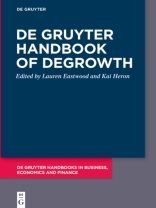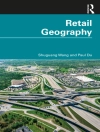Degrowth has emerged as one of the most exciting, and contested, fields of research into the drivers of global heating, ecological collapse, and economic injustice. The perspective is both a critique of existing growth-based models of development, which it argues have put humanity on a collision course with non-negotiable ecological limits, and a vision for a brighter future in which humans and non-humans alike can flourish. By putting an end to growth-seeking economic development and boundless energetic and material throughputs, degrowth’s proponents suggest we can build an economy that meets the material needs of people and planet for generations to come. This handbook’s contributions signal the importance of degrowth across multiple disciplines and practices. Along the way, they grapple with some of the most critical questions, ideological assumptions, policies, and social struggles of our time. The handbook approaches degrowth as a loosely knit and developing set of interdisciplinary propositions about what it might take to achieve a world of human and non-human flourishing. Contributors explore, challenge, and critique degrowth’s propositions and its prospects of shaping scholarly agendas, policy frameworks, and social movements. Essays consider degrowth from a variety of empirical and theoretical vantages, including urban design, architecture, political economy, political ecology, critical geography, and political theory. This integrative approach, at once critical and constructive, aims to preserve for readers the sense of possibility that has drawn people to degrowth scholarship thus far.
Lauren Eastwood & Kai Heron
De Gruyter Handbook of Degrowth [PDF ebook]
De Gruyter Handbook of Degrowth [PDF ebook]
Dieses Ebook kaufen – und ein weitere GRATIS erhalten!
Sprache Englisch ● Format PDF ● Seiten 504 ● ISBN 9783110778359 ● Herausgeber Lauren Eastwood & Kai Heron ● Verlag De Gruyter ● Erscheinungsjahr 2024 ● herunterladbar 3 mal ● Währung EUR ● ID 9441275 ● Kopierschutz Adobe DRM
erfordert DRM-fähige Lesetechnologie












